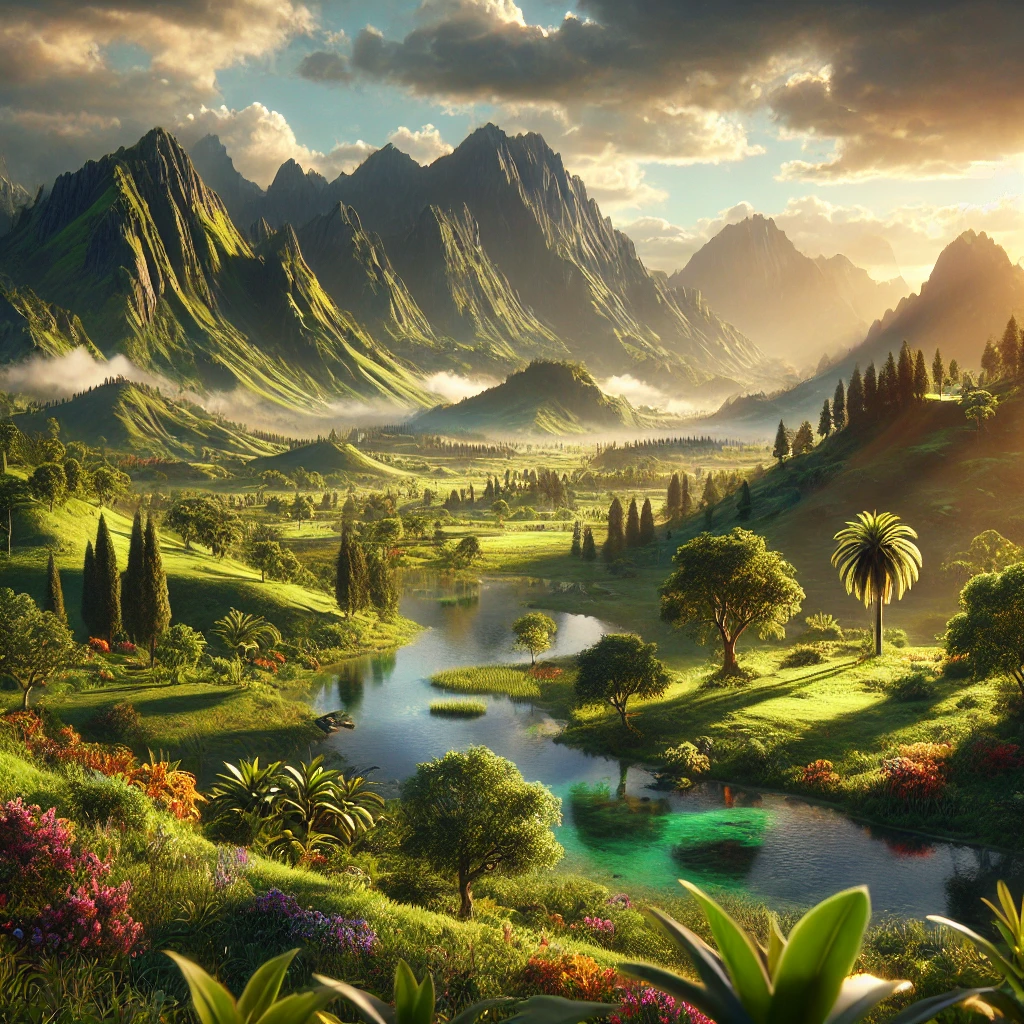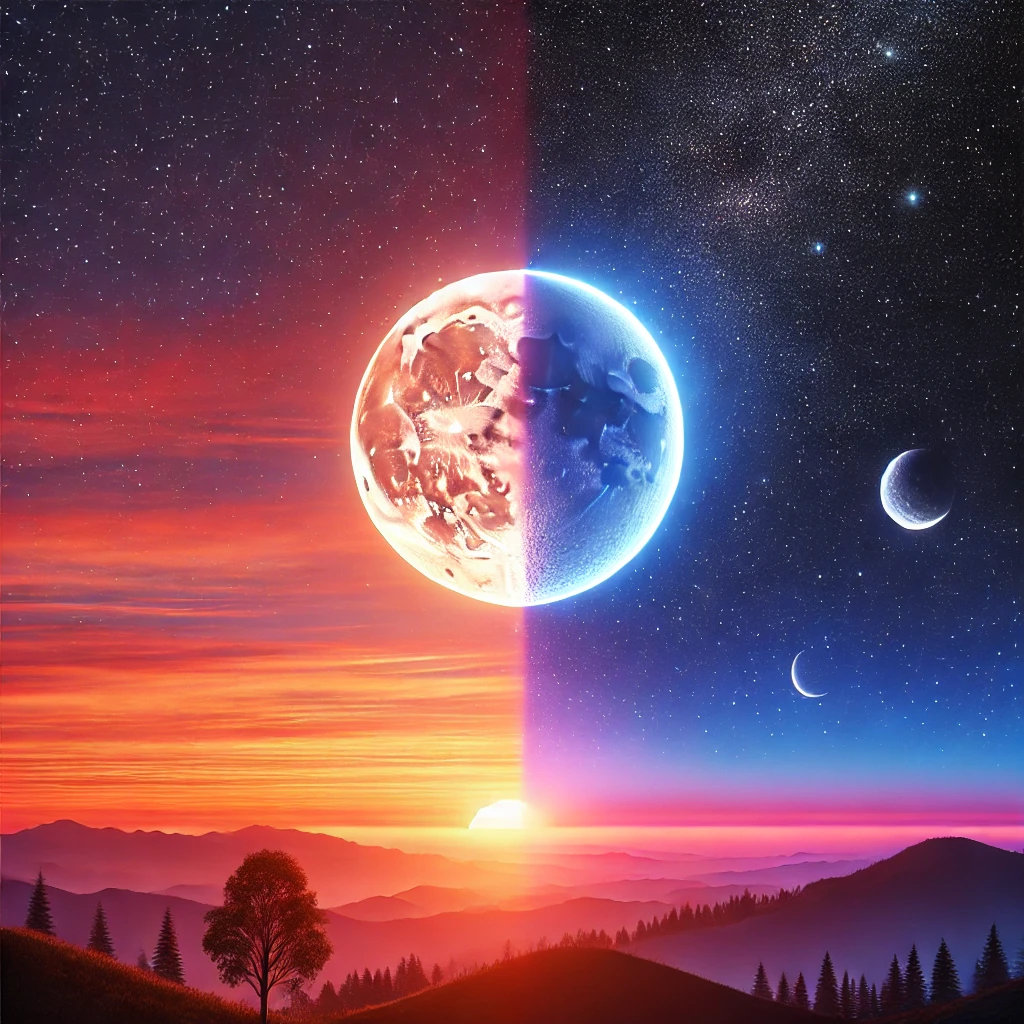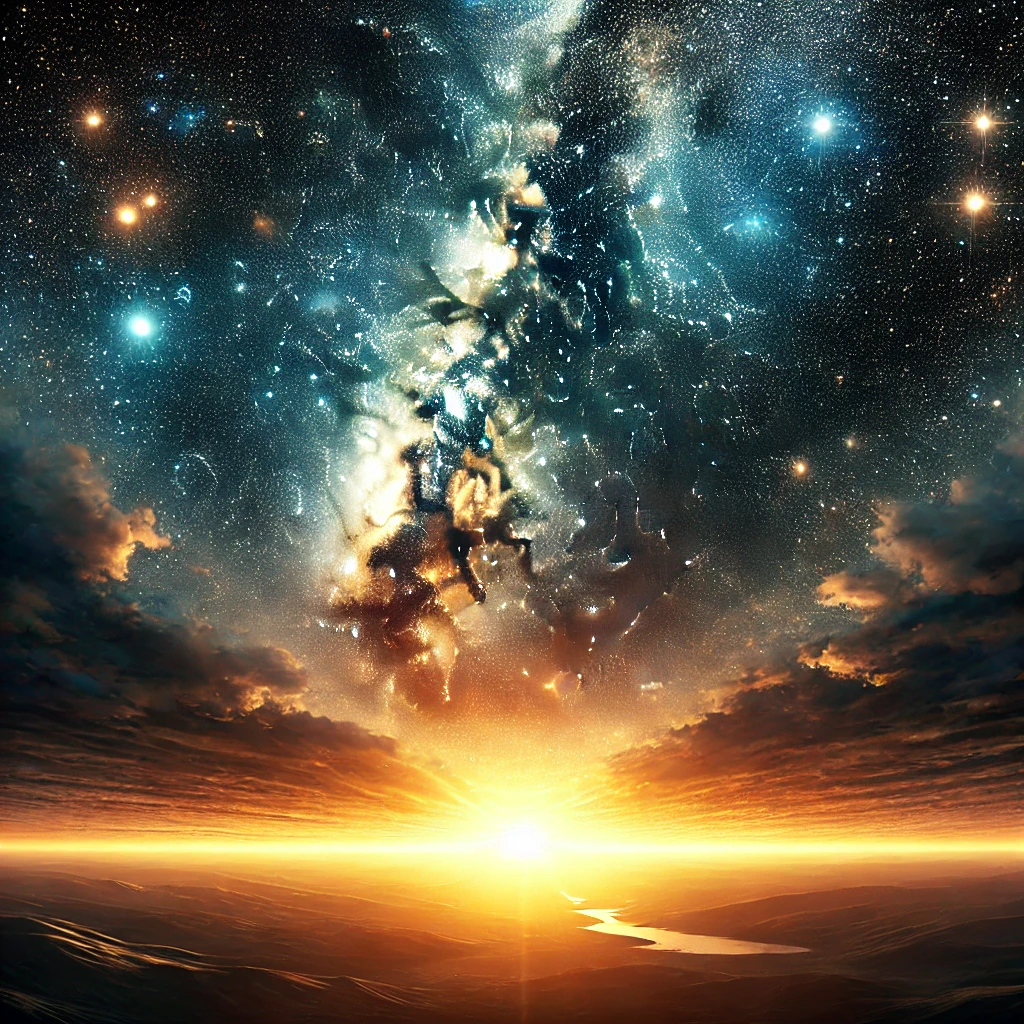The creation of the universe is one of the most profound and awe-inspiring stories found in the Bible. In Genesis, the Bible presents a detailed account of how God brought the heavens, the earth, and all life into existence. This narrative not only explains the origin of creation but also reveals the power, creativity, and love of our Creator.
Genesis: The Beginning of Creation
The Bible opens with the words:
“In the beginning, God created the heavens and the earth.” (Genesis 1:1)
This single verse establishes God as the Creator of all things and sets the stage for the story of creation. Over the next six days, God forms and fills the universe in a systematic and purposeful manner, concluding with a day of rest.
Day-by-Day Account of Creation
Day 1: Light and Darkness
“And God said, ‘Let there be light,’ and there was light.” (Genesis 1:3)
On the first day, God creates light, separating it from darkness. This act establishes the cycles of day and night.
Day 2: The Sky and Waters
“God said, ‘Let there be a vault between the waters to separate water from water.’” (Genesis 1:6)
On the second day, God creates the sky, dividing the waters above from those below, preparing the earth for life.
Day 3: Land, Seas, and Vegetation

“God said, ‘Let the water under the sky be gathered to one place, and let dry ground appear.’” (Genesis 1:9)
God brings forth dry land and creates seas. He also commands the earth to produce vegetation—plants and trees bearing fruit.
Day 4: The Sun, Moon, and Stars
“God made two great lights—the greater light to govern the day and the lesser light to govern the night. He also made the stars.” (Genesis 1:16)
On the fourth day, God establishes celestial bodies to provide light, mark time, and guide seasons.
Day 5: Sea Creatures and Birds
“God said, ‘Let the water teem with living creatures, and let birds fly above the earth across the vault of the sky.’” (Genesis 1:20)
God fills the seas with fish and the sky with birds, blessing them to multiply and fill their habitats.
Day 6: Land Animals and Humanity
“God said, ‘Let us make mankind in our image, in our likeness.’” (Genesis 1:26)
On the sixth day, God creates land animals and humanity. Humans are made in His image, given dominion over creation, and instructed to be fruitful and multiply.
Day 7: A Day of Rest
“By the seventh day God had finished the work He had been doing; so on the seventh day He rested from all His work.” (Genesis 2:2)
God sets apart the seventh day as holy, establishing a pattern of rest and worship.
Key Themes in the Creation Story
1. God’s Sovereignty and Power
The creation story demonstrates God’s absolute authority over the universe. He speaks, and creation obeys, showing His power and control over all things.
2. The Goodness of Creation
After each act of creation, God declares it “good.” This emphasizes the inherent goodness and beauty of His work. Humanity, as the pinnacle of creation, is declared “very good” (Genesis 1:31).
3. Humanity’s Unique Role
Humans are created in God’s image, reflecting His character and given the responsibility to care for the earth. This underscores our value and purpose in God’s creation.
What the Creation Story Teaches Us
The Genesis account of creation is not just a story of origins but a revelation of God’s nature. It teaches us that:
- God is a Creator who delights in beauty and order.
- He cares deeply about humanity and all of creation.
- Creation is a gift to be cherished and stewarded responsibly.
Conclusion: Reflecting on God’s Creation
The creation of the universe as described in Genesis is a testament to God’s majesty and love. It invites us to marvel at the world around us and to worship the One who made it all.
As you reflect on the Genesis account, consider how it shapes your understanding of God and your role in His creation. Take time to admire the beauty of the world, give thanks for His provision, and live as a steward of His incredible handiwork.
The Deeper Meaning of Genesis and the Days of Creation
The Genesis creation account is rich with spiritual and theological meaning, offering insights into God’s character, purpose, and plan for humanity. Each day of creation not only describes what God made but also carries symbolic and practical significance.
Day 1: Light and Darkness
“And God said, ‘Let there be light,’ and there was light.” (Genesis 1:3)
What It Represents:
Day 1 introduces the separation of light from darkness, symbolizing the triumph of order over chaos. Light in the Bible often represents truth, holiness, and God’s presence (John 8:12). This moment signifies the beginning of God bringing clarity and purpose to creation.
Deeper Meaning:
God’s creation of light without yet forming the sun or stars emphasizes His sovereignty. He is the source of light, both physically and spiritually (Revelation 22:5). This act reminds us that God brings illumination and understanding into the world.
Day 2: The Sky and Waters
“God said, ‘Let there be a vault between the waters to separate water from water.’” (Genesis 1:6)
What It Represents:
The separation of waters above (sky) from waters below (seas) reflects God’s order in creation. The “vault,” or firmament, creates a space for life to thrive on earth.
Deeper Meaning:
This day shows God preparing the world to sustain life. It highlights His care and intentionality, as everything is made with precision and purpose. The sky also serves as a constant reminder of God’s majesty (Psalm 19:1).
Day 3: Land, Seas, and Vegetation
“God said, ‘Let the water under the sky be gathered to one place, and let dry ground appear.’” (Genesis 1:9)
What It Represents:
Day 3 brings stability and provision. The appearance of land creates a place for humanity and animals to live, while vegetation ensures sustenance for all living beings.
Deeper Meaning:
The abundance of plants and trees symbolizes God’s provision and generosity. He creates not just what is necessary but also what is beautiful and diverse (Matthew 6:30). This day reflects God’s care for His creation and His desire to bless humanity with resources to thrive.
Day 4: The Sun, Moon, and Stars
“God made two great lights—the greater light to govern the day and the lesser light to govern the night. He also made the stars.” (Genesis 1:16)
What It Represents:
Day 4 establishes the rhythms of time—days, seasons, and years. The celestial bodies provide light and guidance, serving practical and symbolic purposes in creation.

Deeper Meaning:
The creation of the sun, moon, and stars shows God’s authority over time and the cosmos. These lights also remind us of God’s faithfulness, as they mark the passage of time and provide a sense of order in our lives (Psalm 104:19). The vastness of the stars reflects His greatness and creative power (Isaiah 40:26).
Day 5: Sea Creatures and Birds
“God said, ‘Let the water teem with living creatures, and let birds fly above the earth across the vault of the sky.’” (Genesis 1:20)
What It Represents:
This day celebrates the diversity and beauty of life in the sea and sky. It reflects God’s creativity and His desire for the earth to be full of life.
Deeper Meaning:
The blessing given to the creatures—“Be fruitful and increase in number”—emphasizes God’s intention for creation to flourish. The vastness of the seas and the freedom of the birds point to the abundance and boundlessness of God’s love and provision.
Day 6: Land Animals and Humanity
“God said, ‘Let us make mankind in our image, in our likeness.’” (Genesis 1:26)

What It Represents:
Day 6 highlights the creation of humanity as the pinnacle of God’s work. Humans are made in God’s image, setting them apart with the capacity for relationship, creativity, and stewardship over creation.
Deeper Meaning:
Being created in God’s image means reflecting His character—love, wisdom, and justice. Humanity’s role as caretakers of the earth underscores our responsibility to protect and nurture God’s creation. The creation of animals shows God’s attention to detail and His joy in variety.
Day 7: A Day of Rest
“By the seventh day God had finished the work He had been doing; so on the seventh day He rested from all His work.” (Genesis 2:2)
What It Represents:
The seventh day is a day of rest and reflection. God sets this day apart as holy, establishing the Sabbath as a pattern for humanity to follow.
Deeper Meaning:
God’s rest is not about exhaustion but about completion and satisfaction in His work. The Sabbath reminds us of the importance of pausing to worship, reflect, and trust in God’s provision. It points to the ultimate rest we find in Him (Matthew 11:28).
Symbolic Themes in the Days of Creation
- Order from Chaos: God brings structure and purpose to the void (Genesis 1:2).
- Provision and Abundance: Every element of creation is designed to sustain life and reflect God’s generosity.
- Relationship with God: Humanity’s creation in God’s image emphasizes the centrality of our relationship with Him.
- Rest and Worship: The Sabbath points to the rhythm of work and rest as a divine principle.
Conclusion: The Creation Story’s Message for Us
The Genesis account of creation reveals more than the origins of the universe—it unveils the heart of a loving and powerful God. It teaches us about His intentionality, creativity, and care for all life.
As you reflect on the days of creation, consider how each day reveals God’s plan not just for the universe, but for your life. Take time to marvel at His work, give thanks for His provision, and live as a steward of His creation.
FAQ: The Creation of the Universe
1. What does “In the beginning” mean in Genesis 1:1?
“In the beginning” signifies the start of time and creation as we know it. It emphasizes that God existed before anything else and that He is the ultimate Creator of the universe.
2. Why did God create the world in six days?
The six days of creation reflect God’s deliberate and orderly process. Each day builds upon the previous one, showing His intentional design. The seventh day of rest emphasizes the importance of reflection and worship.
3. What does it mean to be made in God’s image?
Being made in God’s image (Genesis 1:26-27) means that humans are created to reflect His character—love, wisdom, creativity, and justice. It also gives us the unique ability to have a relationship with Him and the responsibility to care for His creation.
4. Is the creation story in Genesis literal or symbolic?
Interpretations vary among Christians. Some view the Genesis account as a literal, historical description of creation, while others see it as a symbolic or poetic explanation of God’s creative power. Both perspectives affirm God as the Creator.
5. What is the significance of God resting on the seventh day?
God’s rest on the seventh day is a model for humanity to follow. It highlights the importance of taking time to reflect, worship, and rest from work. The Sabbath also points to spiritual rest in God’s presence (Exodus 20:8-11).
6. Why did God declare creation “good”?
When God declared creation “good” (Genesis 1:31), it reflected His perfect design and purpose. Everything He created was in harmony, showing His care and attention to every detail.
7. How does the Genesis creation story relate to science?
Many believers see the Genesis account and scientific discoveries as complementary rather than contradictory. Genesis focuses on the “why” of creation—God’s purpose and intent—while science explores the “how” of the universe’s physical processes.
8. What does Genesis teach us about God’s character?
Genesis reveals God as powerful, creative, intentional, and loving. It shows that He values order, beauty, and relationships, and it emphasizes His desire for humanity to live in harmony with Him and His creation.
9. How can the creation story inspire our daily lives?
The creation story reminds us of God’s sovereignty, provision, and love. It encourages us to marvel at His handiwork, care for the environment, and live with purpose as stewards of His creation.
Have More Questions?
If you have additional questions about the creation story in Genesis or its meaning, feel free to ask in the comments! Our community is here to help you explore and understand this foundational part of the Bible.
